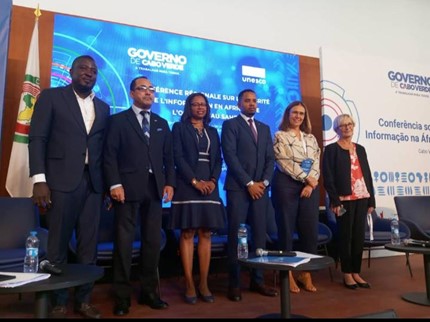By Millicent Senava Mannah
More than 150 policymakers, media practitioners, civil society leaders, and international partners have met in Praia, Cabo Verde, this week for the Regional Conference on Information Integrity in West Africa and the Sahel. The three-day event, running from September 3–5, is being hailed as a landmark moment for regional cooperation against disinformation, hate speech, and manipulation of information in fragile democratic and crisis contexts.
The conference opened at the National Assembly Hall with keynote addresses from senior dignitaries, including Dr. Lourenço Lopes, Assistant Secretary of State to the Prime Minister of Cabo Verde; Dr. Ismaila Ceesay, Gambia’s Minister of Information, Media and Broadcasting Services; Sylvie Coudray, Director of the Division for Freedom of Expression and Media Development at UNESCO; Hon. Daniel O. Sando, Liberia’s Deputy Minister for Press and Public Affairs; Patricia Portela de Souza, UN Resident Coordinator in Cabo Verde; and Hon. Ourveena Geereesha Topsy-Sonoo, the African Union’s Special Rapporteur on Freedom of Expression and Access to Information.
Speakers underlined the urgency of building resilient information ecosystems in a region often tested by electoral disputes, violent extremism, and humanitarian crises. They noted that disinformation campaigns and hate speech have the potential to inflame social tensions, erode public trust in institutions, and destabilize fragile democracies.
Sierra Leone is playing an active role in the discussions. Representing the Ministry of Information and Civic Education, Mr. Emmanuel Abubakar Benoni Turay, Acting Director of Government Information Services, is scheduled to deliver remarks on “Nurturing Societal Trust and Safeguarding Information Integrity During Conflict, Crisis, and Elections, Challenges and Strategic Responses in West Africa and the Sahel.”
In his intervention, Mr. Turay emphasized Sierra Leone’s readiness to collaborate with regional partners. And that the conference is not only a platform for dialogue, it is a call to action.
“Sierra Leone stands ready to work with regional partners to safeguard the integrity of our information ecosystems and uphold the democratic values that bind our nations together.” He said.
Also present in Praia is Dr. Ibrahim Seaga Shaw, Chairman of Sierra Leone’s Right to Access Information Commission, who is contributing to the technical and policy discussions.
The conference agenda goes beyond declarations. Expert panels on the opening day examined emerging technologies, structural threats to information integrity, and the role of media literacy in strengthening democratic resilience. Breakout sessions focused on proactive data disclosure, regulatory innovation, and strategies for mitigating the impact of disinformation on social cohesion.
Over the coming days, delegates are expected to validate the Praia Action Plan and adopt a Model Policy for Information Integrity in West Africa and the Sahel. Both frameworks aim to provide governments and institutions with practical tools to counter disinformation while respecting human rights, promoting transparency, and ensuring inclusive access to public information.
The timing of the conference is significant. Across West Africa and the Sahel, disinformation and manipulated narratives have become tools in political contestation, conflict, and even violent extremism. In several countries, false information has fueled electoral violence, undermined peacebuilding efforts, and stoked distrust between citizens and governments.
For Sierra Leone, which has made substantial progress in democratic consolidation since the end of its civil war, protecting information integrity is increasingly seen as central to maintaining peace and stability. The government has already adopted measures such as the repeal of the criminal libel law, investments in media development, and the promotion of digital literacy. Participation in Praia underscores its intention to link national efforts to regional strategies.
Organised by the Government of Cabo Verde with support from UNESCO, ECOWAS, and other international partners, the Praia conference is being described by participants as a turning point in how West Africa responds to information disorder.
If successful, the validation of the Praia Action Plan and the adoption of the Model Policy could provide the region with its first coordinated framework to tackle disinformation, promote media responsibility, and strengthen democratic resilience.
For Sierra Leone’s delegation, the stakes are clear. As Mr. Turay noted, safeguarding information integrity is not just a policy goal, it is a matter of national security, democratic survival, and regional stability.


